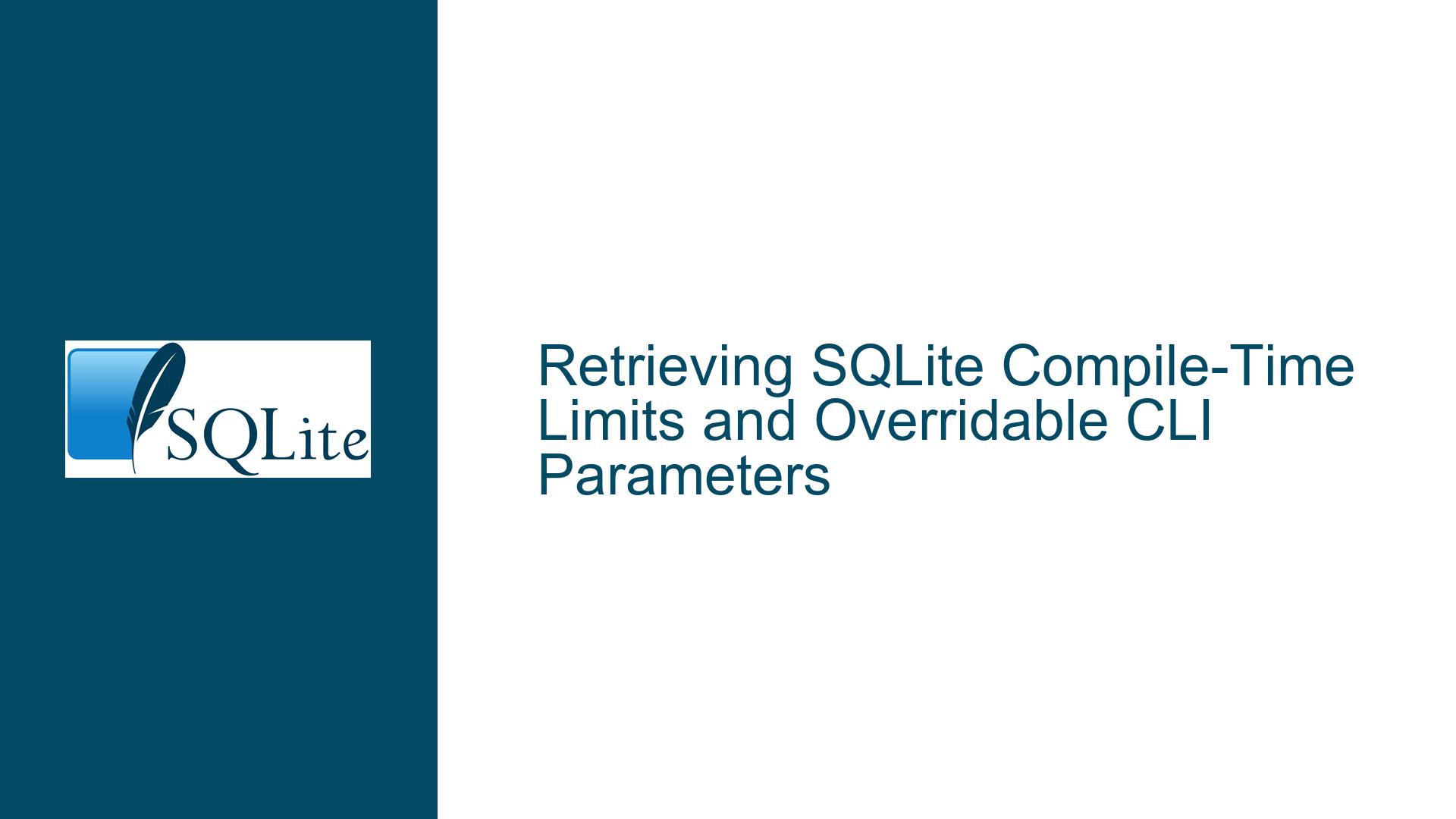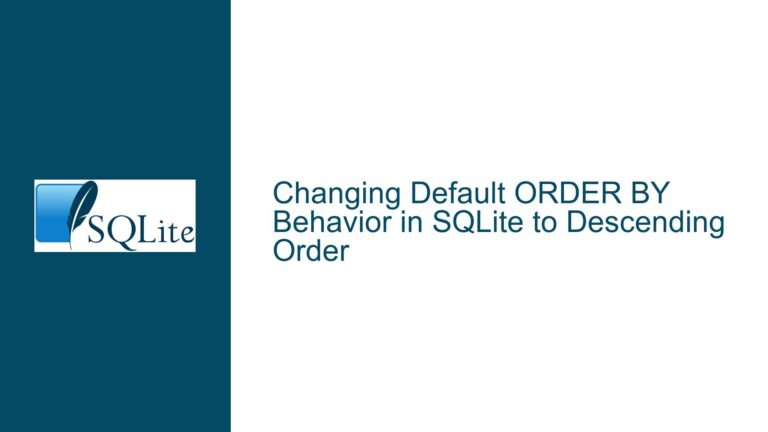Retrieving SQLite Compile-Time Limits and Overridable CLI Parameters
Retrieving SQLite Compile-Time Configuration Values via SQL Queries
SQLite’s internal configuration parameters, such as SQLITE_MAX_COLUMN or SQLITE_MAX_VARIABLE_NUMBER, are determined at compile time. These settings define the upper bounds for database operations and influence performance, compatibility, and resource usage. A common requirement for developers and administrators is to programmatically retrieve these values to validate environment constraints, debug schema design issues, or ensure compatibility across deployments. This guide addresses three interconnected challenges:
- Extracting compile-time configuration values using SQL statements.
- Enumerating all implementation limits programmatically.
- Identifying which parameters can be overridden at runtime via CLI startup options or PRAGMAs.
This post provides a comprehensive exploration of these topics, including practical solutions, limitations of standard approaches, and advanced techniques for working with SQLite’s configuration landscape.
Extracting Compile-Time Configuration Values via PRAGMA_COMPILE_OPTIONS
Understanding Compile-Time vs. Runtime Configuration
SQLite’s behavior is influenced by two types of configurations:
- Compile-Time Options: Defined when the SQLite library or CLI is built. Examples include
SQLITE_MAX_COLUMN(maximum number of columns in a table) orSQLITE_THREADSAFE(threading mode). These cannot be altered without recompiling the library. - Runtime Parameters: Adjusted after database initialization using PRAGMAs (e.g.,
PRAGMA cache_size) or CLI commands. These do not require recompilation.
The PRAGMA compile_options command returns a list of compile-time options enabled for the current SQLite instance. Each row in the result corresponds to a macro that was set during compilation. For example:
SELECT compile_options FROM pragma_compile_options WHERE compile_options LIKE 'MAX_COLUMN=%';
-- Output: MAX_COLUMN=2000
This query extracts the value of SQLITE_MAX_COLUMN, which is reported as MAX_COLUMN=2000 in the result set. Note that the prefix SQLITE_ is omitted in the output.
Parsing PRAGMA_COMPILE_OPTIONS Output
The raw output of PRAGMA compile_options includes all compile-time settings, not just limits. To isolate implementation limits like MAX_COLUMN, filter results using pattern matching:
SELECT
substr(compile_options, 12) AS max_column
FROM pragma_compile_options
WHERE compile_options LIKE 'MAX\_COLUMN=%' ESCAPE '\';
The substr function removes the MAX_COLUMN= prefix, returning only the numeric value. Similar queries can retrieve other limits by adjusting the filter condition (e.g., LIKE 'MAX_VARIABLE_NUMBER=%').
Limitations of PRAGMA_COMPILE_OPTIONS
- Inconsistent Naming Conventions: Some compile-time options use different naming formats. For instance,
SQLITE_DEFAULT_CACHE_SIZEis reported asDEFAULT_CACHE_SIZE=-2000, while thread safety is indicated byTHREADSAFE=1. - Undocumented or Unreported Options: Certain parameters, such as
SQLITE_MAX_ATTACHED, may not appear inPRAGMA compile_optionsif they were not explicitly set during compilation (i.e., left at default values). - Ambiguity in Multi-Value Options: Some options combine multiple settings (e.g.,
HAVE_USLEEP=1andOMIT_LOAD_EXTENSION). These require additional parsing to interpret.
To address these issues, cross-reference the output with SQLite’s compile-time options documentation and validate against known defaults.
Enumerating SQLite Implementation Limits Programmatically
Mapping PRAGMA_COMPILE_OPTIONS to Known Limits
SQLite’s implementation limits are listed in the limits.html documentation. To programmatically retrieve these, create a lookup table of known limit names and match them against PRAGMA compile_options:
WITH limit_names(limit_name) AS (
VALUES
('MAX_COLUMN'),
('MAX_COMPOUND_SELECT'),
('MAX_VARIABLE_NUMBER'),
('MAX_ATTACHED')
)
SELECT
limit_name,
substr(compile_options, length(limit_name) + 2) AS limit_value
FROM pragma_compile_options
JOIN limit_names ON compile_options LIKE limit_name || '=%';
This query joins PRAGMA compile_options with a list of known limits, extracting their values. Note that not all limits may appear in the output, depending on compilation settings.
Handling Default Values
If a limit does not appear in PRAGMA compile_options, it is set to its default value. For example, SQLITE_MAX_ATTACHED defaults to 10. To include defaults in your output, modify the query to use a LEFT JOIN and coalesce missing values:
WITH limit_info(limit_name, default_value) AS (
VALUES
('MAX_COLUMN', 2000),
('MAX_COMPOUND_SELECT', 500),
('MAX_VARIABLE_NUMBER', 32766),
('MAX_ATTACHED', 10)
)
SELECT
li.limit_name,
COALESCE(
substr(pco.compile_options, length(li.limit_name) + 2),
li.default_value
) AS limit_value
FROM limit_info li
LEFT JOIN pragma_compile_options pco
ON pco.compile_options LIKE li.limit_name || '=%';
Edge Cases and Platform-Specific Behavior
- Dynamic Limits: Some limits, like
SQLITE_MAX_VARIABLE_NUMBER, can be increased at runtime up to a compile-time ceiling usingPRAGMA max_variable_number. The value returned byPRAGMA compile_optionsreflects this ceiling. - Memory-Related Limits: Parameters such as
SQLITE_MEMDB_DEFAULT_MAXSIZE(default in-memory database size) may not be retrievable via SQL and require inspecting the C preprocessor macros used during compilation.
For scenarios where PRAGMA compile_options is insufficient, consider embedding SQLite’s C API functions (e.g., sqlite3_limit()) into a custom application or extension.
Overriding SQLite Configuration Parameters via CLI and PRAGMAs
Distinguishing Compile-Time vs. Runtime Adjustments
Most SQLite implementation limits cannot be changed after compilation. For example, SQLITE_MAX_COLUMN defines an absolute maximum for the number of columns in a table. Attempting to exceed this limit will result in an error, regardless of runtime settings.
However, certain parameters can be modified at runtime:
- PRAGMA Commands: Adjust settings like
cache_size,synchronous, orjournal_mode. - CLI Startup Parameters: The SQLite3 shell supports command-line options (e.g.,
-cmd "PRAGMA cache_size=1000") to execute PRAGMAs before entering interactive mode. - Dot-Commands: CLI-specific directives like
.limitor.openconfigure shell behavior but do not affect the SQLite library itself.
Identifying Overridable Parameters
To determine which parameters can be adjusted without recompiling SQLite:
- Consult the PRAGMA documentation for runtime-modifiable settings.
- Use the CLI
.helpcommand to list available dot-commands. - Verify parameter mutability by attempting to set it:
PRAGMA cache_size = 1000;
PRAGMA cache_size; -- Returns 1000 if successful
CLI-Specific Overrides
The SQLite3 shell allows pre-execution of PRAGMAs using the -cmd flag:
sqlite3 -cmd "PRAGMA cache_size=2000;" mydatabase.db
This sets the cache size before the interactive prompt appears. To persist changes across sessions, include PRAGMAs in a .sqliterc file or use PRAGMA user_version to track configuration states.
Immutable Parameters and Workarounds
For parameters that cannot be overridden (e.g., SQLITE_MAX_COLUMN), the only solution is to recompile SQLite with the desired settings. This involves:
- Downloading the SQLite amalgamation source code.
- Modifying the
#definestatements insqlite3.c(e.g.,#define SQLITE_MAX_COLUMN 32767). - Compiling a custom CLI or library binary.
Automating Configuration Audits
To audit an SQLite environment programmatically:
- Query
PRAGMA compile_optionsto retrieve compile-time limits. - Cross-reference with a known list of runtime-adjustable PRAGMAs.
- Generate a report highlighting parameters requiring recompilation.
For example, a Python script using the sqlite3 module could:
import sqlite3
conn = sqlite3.connect(':memory:')
cursor = conn.cursor()
# Retrieve compile-time limits
cursor.execute("SELECT compile_options FROM pragma_compile_options")
compile_options = [row[0] for row in cursor.fetchall()]
# Check runtime-adjustable parameters
cursor.execute("PRAGMA cache_size")
cache_size = cursor.fetchone()[0]
print(f"Compile-Time Limits: {compile_options}")
print(f"Runtime Cache Size: {cache_size}")
Final Recommendations and Best Practices
- Standardize Compilation Settings: Ensure all deployments use SQLite binaries compiled with identical options to avoid compatibility issues.
- Validate Limits Early: Check
PRAGMA compile_optionsduring application startup to detect incompatible environments. - Use Runtime PRAGMAs Judiciously: Overriding parameters like
cache_sizecan improve performance but may lead to resource contention in multi-tenant systems. - Document Custom Builds: Maintain a record of compile-time options used for each SQLite build to simplify troubleshooting.
By combining SQL queries, runtime checks, and compile-time audits, developers can fully characterize their SQLite environment and address configuration-related issues proactively.






